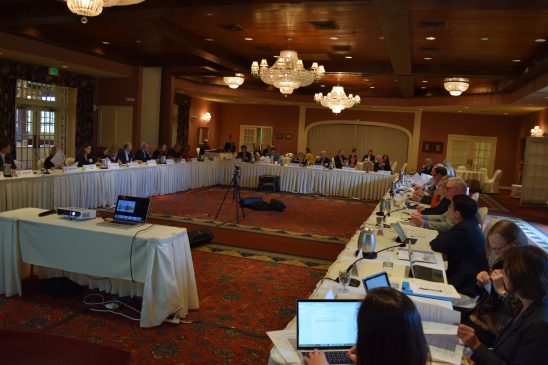 NEBHE convened its Annual Fall Board Meeting near Lake Winnipesaukee in New Hampshire in September on the overarching themes of “Tradition, Transition and Transformation: Sustaining New England’s Higher Education Industry and Advantage.”
NEBHE convened its Annual Fall Board Meeting near Lake Winnipesaukee in New Hampshire in September on the overarching themes of “Tradition, Transition and Transformation: Sustaining New England’s Higher Education Industry and Advantage.”
Over two days, NEBHE delegates explored the impact of changing demography, declining enrollments and opportunities for “demand cultivation” and strategies to sustain higher education’s financial sustainability in the region.
NEBHE has examined these issues in recent years as part of its Higher Education Innovation Challenge (HEIC). These challenges continue to come into sharper focus, as state and federal investment in higher education lags, public perceptions of higher ed change, and enrollment projections increase the focus at many higher education institutions on financial sustainability and new ways of doing business. Many institutions are considering opportunities with new student segments, including adults, and international students (the latter made more challenging by the current climate of global politics and immigration). Other institutions are exploring new program models such as shortened time to degrees, badges and other credentials.
At Winnipesaukee, delegates focused on opportunity. They charged NEBHE with supporting regional efforts to provide data on nontraditional, underserved, immigrant, adult students in New England, and developing a clearinghouse of best practices and policies to drive enrollment and completion. They called on NEBHE to develop strategies to engage with PK-12, including career and technical education, to reduce barriers to matriculation, specifically in urban and rural areas via early college, dual enrollment and college readiness initiatives. NEBHE delegates also urged examining the return on investment (ROI) of postsecondary credentials to adult students and the institutions serving them.
NEBHE staff developed various short documents to inform the board’s discussion, including “Projecting Higher Education Supply and Demand.” This report examines the projected decline in high school graduates and its impact on higher education enrollment.
During a session focused on “Policy, Regulation and Accreditation,” attendees spoke of pursuing shared marketing and recruitment strategies to support growth in demand and participation in postsecondary education in the region. Among the favored options: expanded use of credit for prior learning to bolster student markets and improved transfer of prior credits and other credentials. Delegates also endorsed engaging employers and policymakers to review student debt forgiveness policies and expanding targeted student aid programs (and 529 plans) to retain college-going students who are currently being tempted away from New England by less expensive institutions, especially in the South.
Other key recommendations that emerged from the discussions included: increase the minimum wage (which one presenter noted as the past year’s most important policy move enhancing college-going and completion for working learners) and explore paid work and internship options for adult students.
The NEBHE delegates also urged development of new models of cost savings across institutions and sectors, including Open Education Resources (OER) and additional strategic alliances to support the shared provision of academic and other activities among multiple institutions.
 NEBHE delegates continued their review of a “Call to Action,” which cites the need for new models to address challenges and opportunities facing the New England higher education sector. After a productive group drafting process, delegates agreed to revisit such a communique for sharing with stakeholders in education, business, policy and other relevant sectors.
NEBHE delegates continued their review of a “Call to Action,” which cites the need for new models to address challenges and opportunities facing the New England higher education sector. After a productive group drafting process, delegates agreed to revisit such a communique for sharing with stakeholders in education, business, policy and other relevant sectors.
A meeting of NEBHE’s Legislative Advisory Committee (LAC) focused on higher education cost drivers, as well as issues ranging from funding early childhood education to addressing teacher shortages to free college plans to ensuring civility in the halls of government in an age of term limits.
NEBHE also took the opportunity to present Excellence Awards to former New Hampshire Director of Higher Education and University System of New Hampshire (USNH) Chancellor Edward MacKay and Nashua Community College President Lucille Jordan. MacKay and Jordan were joined by a large group of invited guests, including a notable number of presidents and leaders of New Hampshire’s public and independent higher education institutions.
[ssba]
